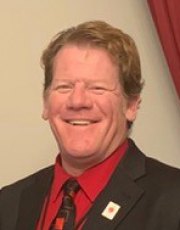Central Union Superintendent Tom Addington appointed to national school's post

The appointment took place at the 2020 Summer NAFIS Board Meeting.
As a member of the NAFIS Board of Directors, Addington will serve as a national leader in advocating for school districts that receive Impact Aid. In this role, he will work with other board members from across the country to guide the association’s public policy work and oversee plans for the association. As the Region VI Director, Addington represents eight states: California, Nevada, Arizona, Oregon, Washington, Idaho, Hawaii, and Alaska.
Impact Aid reimburses school districts for the loss of revenue caused by the presence of nontaxable Federal property, including military installations; Indian Trust, Treaty and Alaska Native Claims Settlement Act lands; Federal low-income housing facilities; and national laboratories and other federal buildings and property. It helps ensure students who attend schools on or near Federal property have access to a quality education.
“Central Union Elementary is a small school district located in the heart of the San Joaquin Valley of Central California. Though in a rural area, within the district, we have two Federal properties, NAS-Lemoore, and the Santa Rosa Rancheria, and close to 85% of our students are federally connected,” said Addington.
“Impact Aid is vital to every aspect of our school operations and support for our students. These funds directly allow for competitive salary and benefits to attract and retain staff, and they support our overall educational options for our students – including art, music, physical education, school counselors and school psychologists – and comprehensive health services. Impact Aid funding is also critical to our educational technology, supporting our K-8 1:1 iPad program and district infrastructure.”
Addington has worked in public education for over 30 years. He is entering his ninth year as superintendent at Central Union, and his 21st in the district. Before moving into administration, he spent ten years as a school psychologist. He also has experience with special education, educational technology, counseling, site administration, and human resources.
Addington has been active with the Association of California School Administrators (ACSA) for the past 20 years. He has held several leadership positions in the organization, including as chair at the charter and region level, serving on the state HR Council for six years and heading the Statewide Negotiator Symposium for three years.
He served two years as ASCA Region XI Vice-President of Legislative Action and two years as a representative on the Statewide Superintendents Council. He has also received many honors from the organization, including being named the 2017 ASCA Region XI Superintendent of the Year. He currently serves on the executive board of the Central Valley Education Coalition. In addition, he is the incoming president of CAFIS, the California Association of Federally Impacted Schools.
“I am honored to serve as a member of the NAFIS board,” Addington continued. “Over the years of my involvement with NAFIS, I have valued the singular purpose of all subgroups of the association, with a unified message for the education of students in federally impacted school districts. I look forward to contributing to this ongoing purpose and mission for our students.”
“The NAFIS Board plays a critical role in ensuring that students in federally impacted school districts receive the resources that they deserve,” said NAFIS Executive Director Hilary Goldmann. “Tom brings important insight into the needs of these school districts, their students, and their communities, as well as a wealth of experience and ideas from which NAFIS will benefit.”
Addington’s term will last for two years.
Navy News
- For fourth year in a row, Stratford Elementary School welcomes Sandridge Partners who awards scholarships to 8th graders
- West Hills College Chancellor, Dr. Kristin Clark, announces her retirement, effective July 2024
- West Hills College officials host groundbreaking for new Lemoore Visual Arts and Applied Science Building in Lemoore
- West Hills College Lemoore to hold groundbreaking for new Visual Arts & Applied Sciences Building on December 1
- West Hills College Coalinga and Lemoore campus vie for 2025 Aspen Prize for college excellence
- Mary Immaculate Queen School's annual Fall Festival, held Sunday, Oct. 1, greets hundreds of local guests
_0.jpg)

.jpg)



